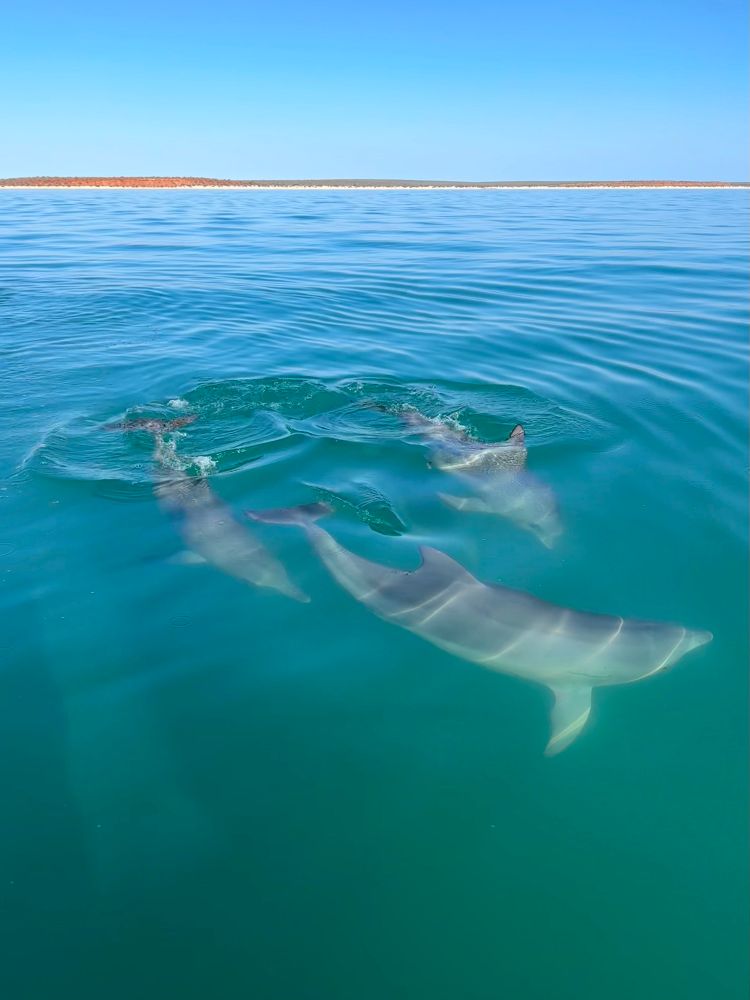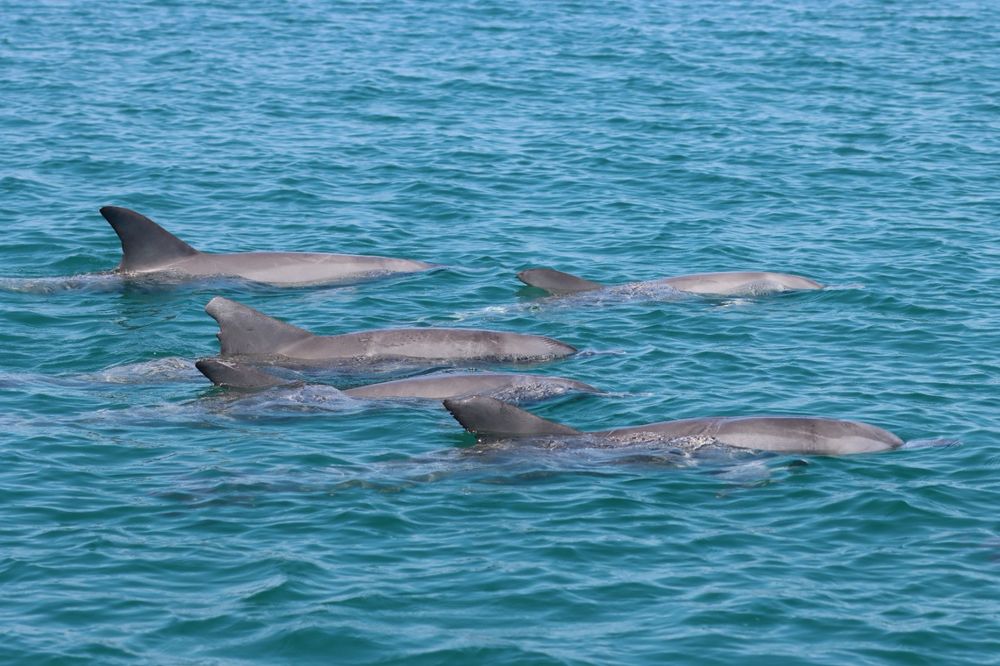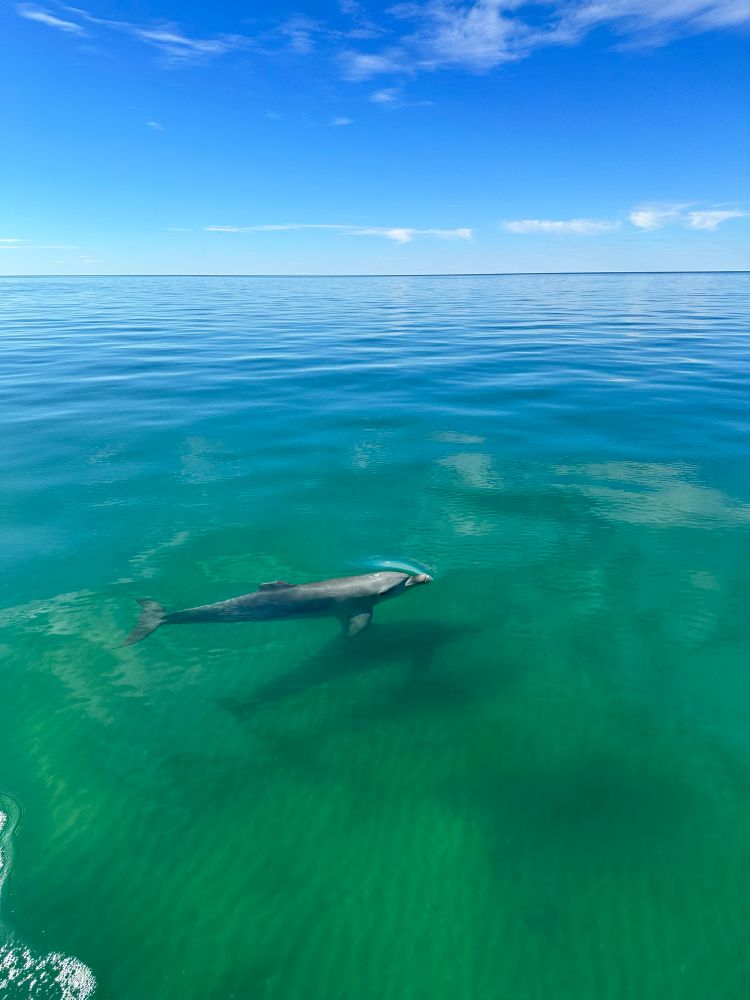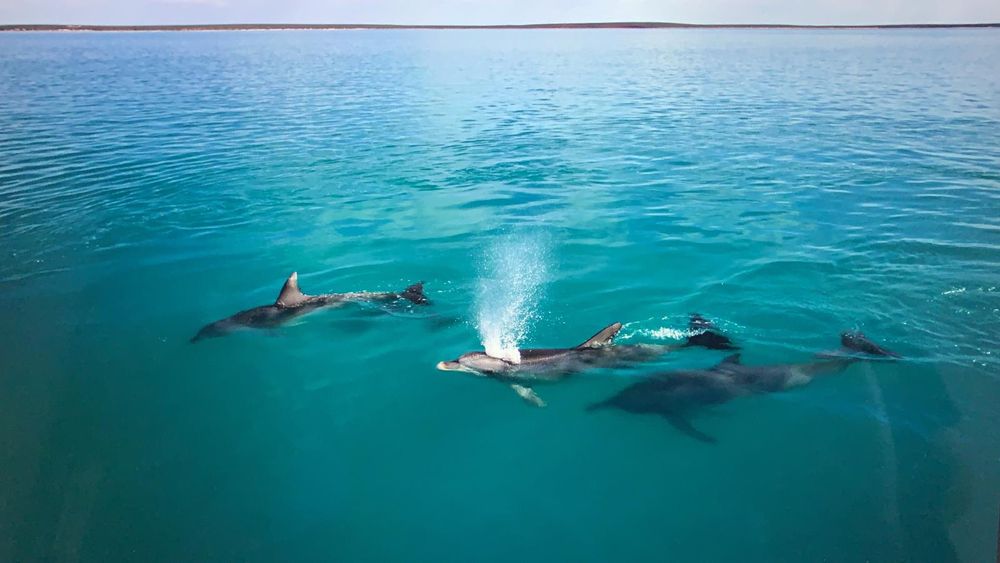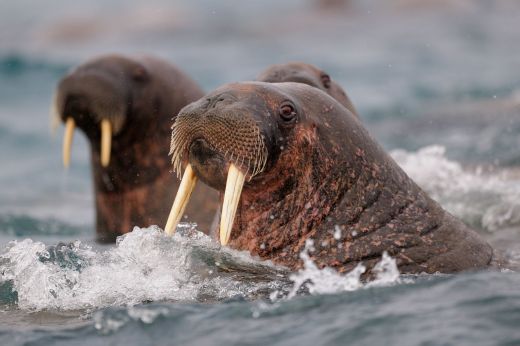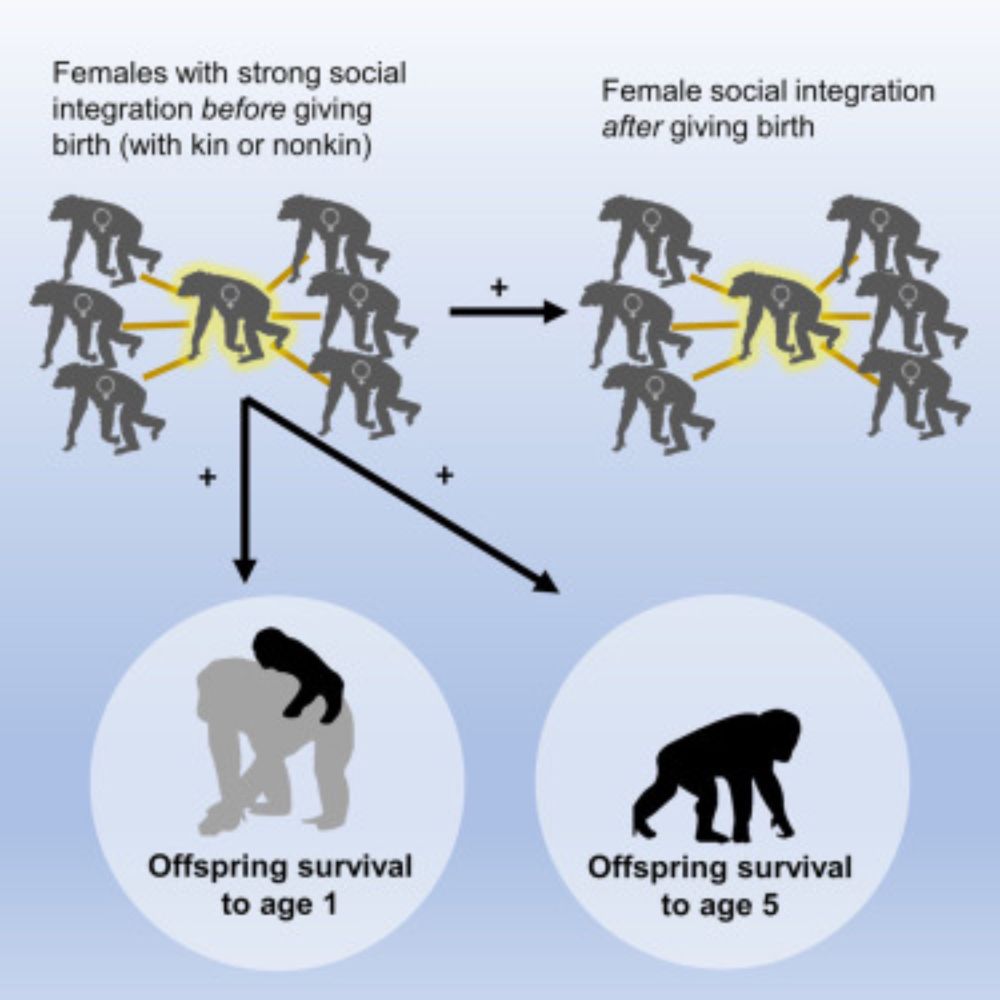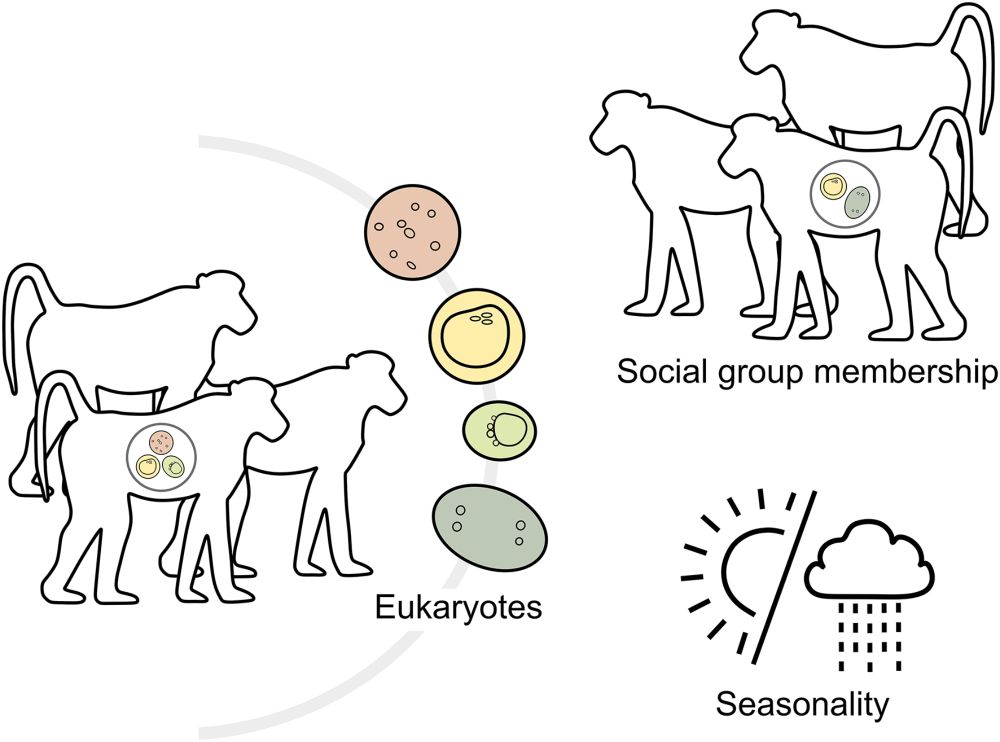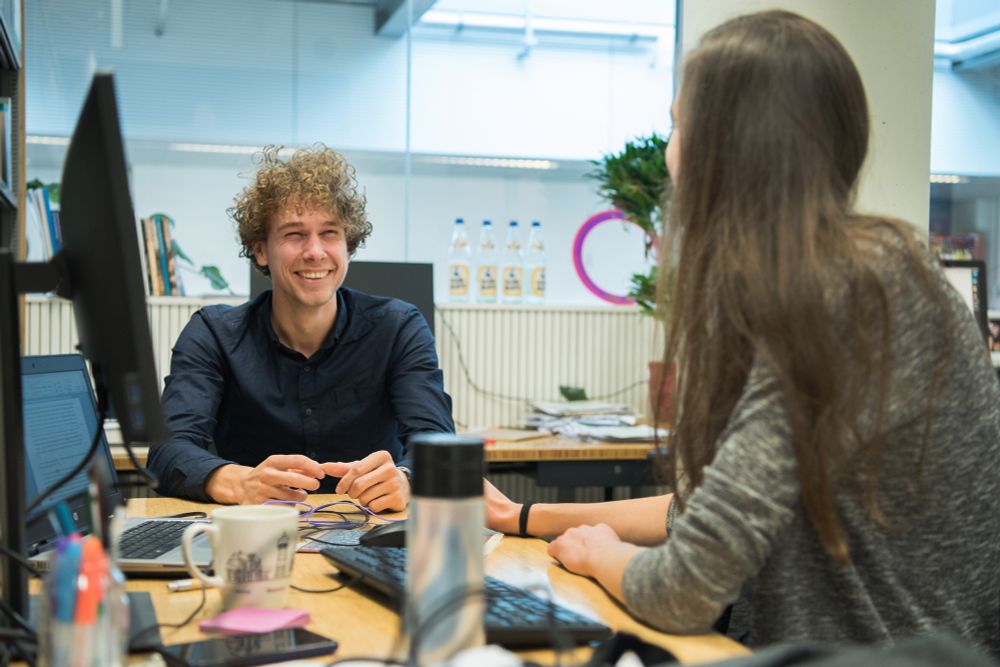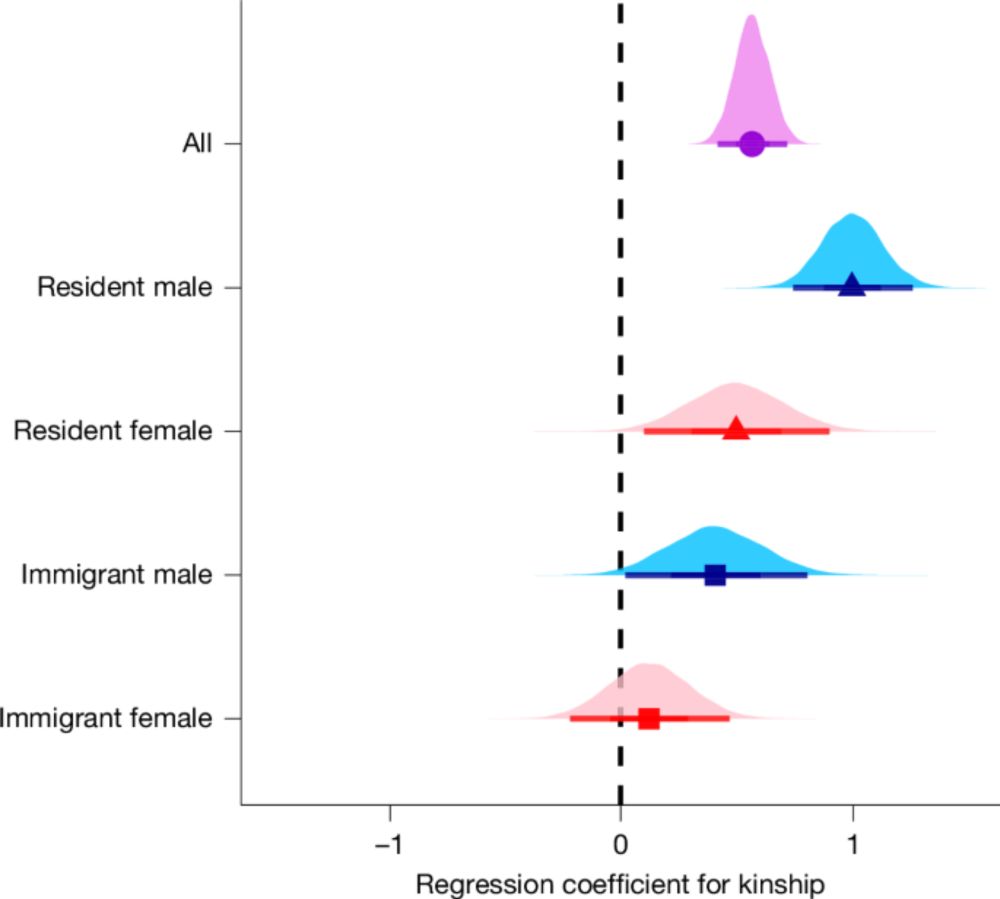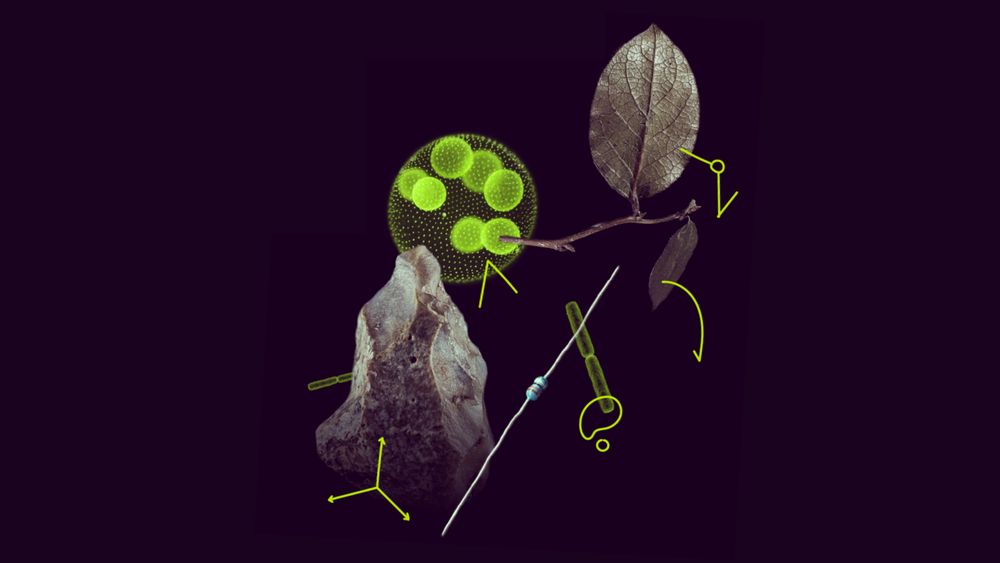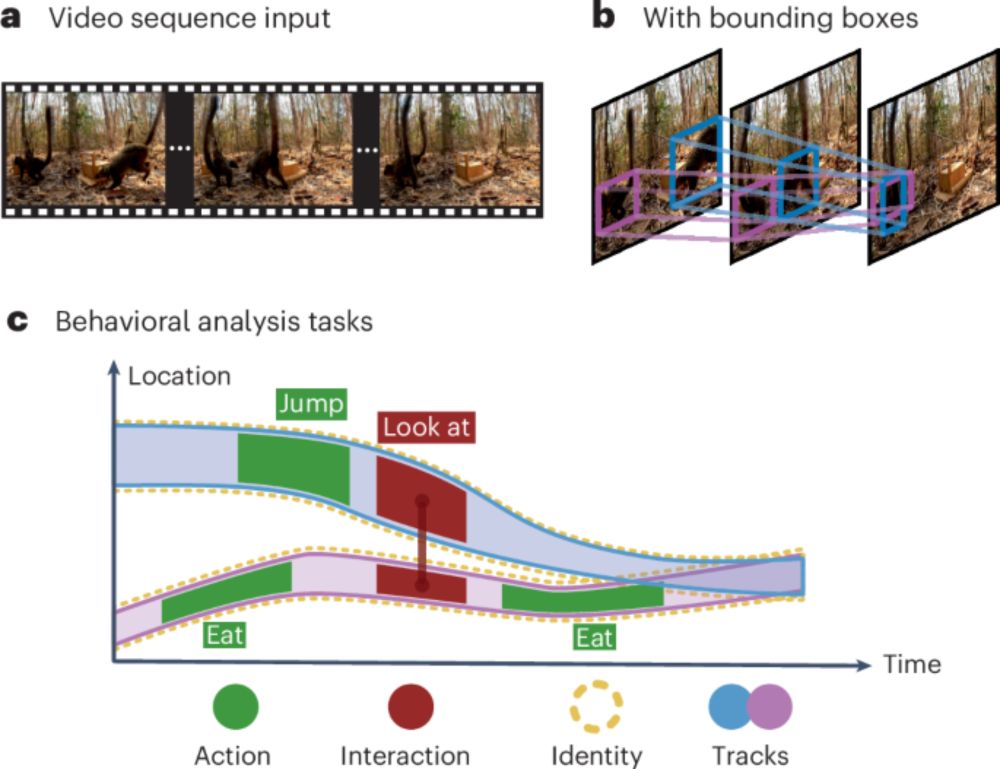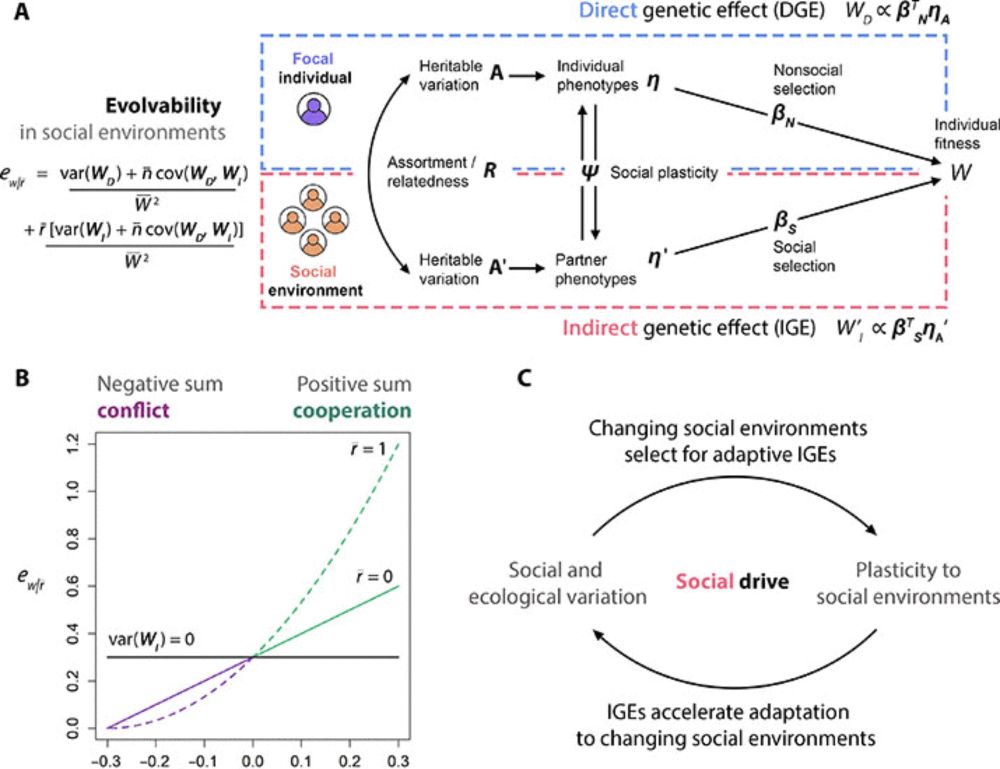
Indirect genetic effects among neighbors promote cooperation and accelerate adaptation in a small-scale human society
Social effects on fertility promote population growth and the evolution of flexible cooperation in a small-scale human society.
I'm very excited to share the central paper from my PhD out now in Science Advances. We investigated how social effects among neighbors shape the evolution of reproductive cooperation and the pace of adaptive population growth among the Indigenous Tsimane of Bolivia.
www.science.org/doi/10.1126/...
30.07.2025 19:40 — 👍 29 🔁 16 💬 1 📌 2
A bit early to advertise, but why not... 👉 I will be recruiting a post-doc to work on gut microbiome variation in wild ungulates starting at some point in 2026. Strong expertise with shotgun data and host phenotype-microbiome associations would be very valuable. Email me to discuss!
19.12.2024 15:33 — 👍 17 🔁 12 💬 1 📌 1
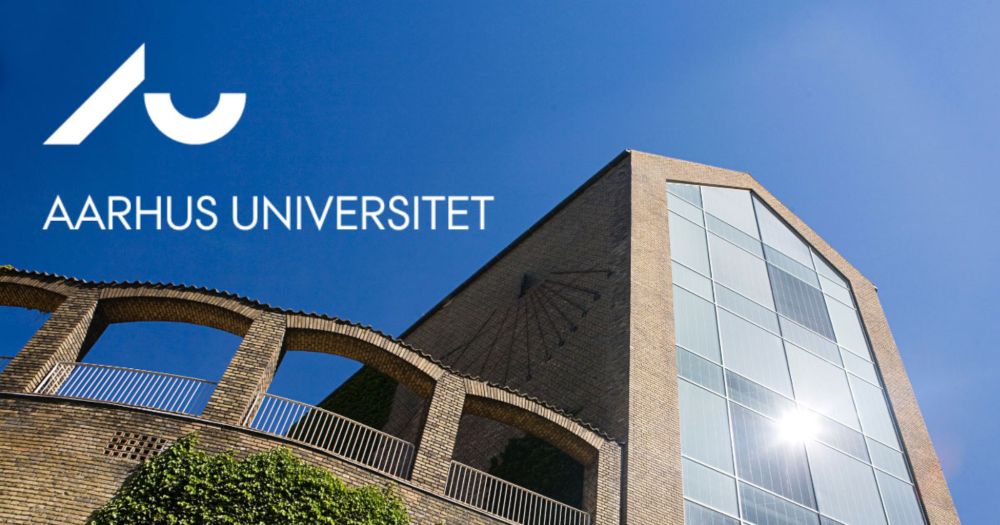
Tenure-Track Assistant Professor in Biodiversity Research Using Genetics - Vacancy at Aarhus University
Vacancy at Center for Quantitative Genetics and Genomics, Aarhus University
JOB ALERT 🚨 Tenure-track assistant professor in population genetics, comparative genomics and/or bioinformatics applied to biodiversity monitoring and conservation biology at Aarhus University, Denmark.
Aarhus is super nice y'all. Apply! 🧪 🌍 🧬 #AcademicSky #ScienceJobs
tech.au.dk/en/about-the...
11.07.2025 13:40 — 👍 18 🔁 25 💬 0 📌 0
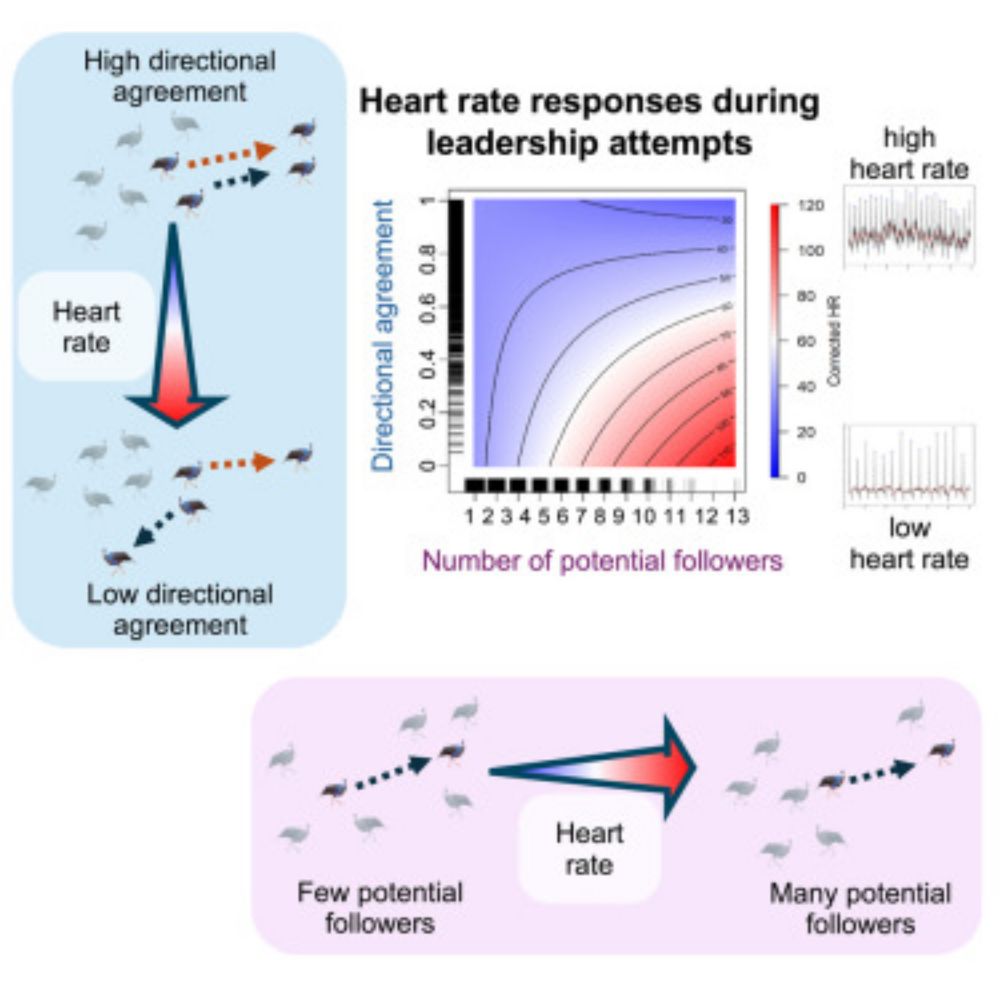
The physiological cost of leadership in collective movements
Individuals can gain substantial benefits from collective actions.1,2,3,4,5,6,7 However, collective behaviors introduce new challenges, like coordinat…
Out now: The physiological costs of leadership
We reveal that initiating movements—especially when attempting to initiate against a majority and when there is directional conflict—drives elevated heart rates in vulturine guineafowl
www.sciencedirect.com/science/arti...
@currentbiology.bsky.social
22.07.2025 20:24 — 👍 44 🔁 18 💬 0 📌 0
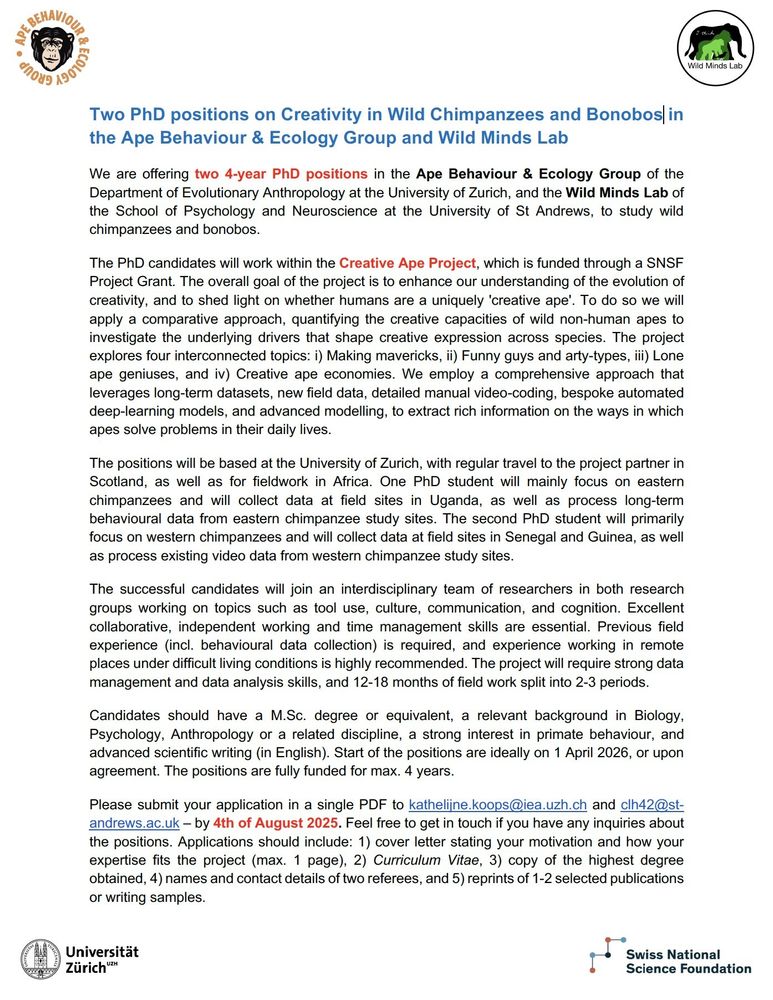
two 4-year PhD positions in the Ape Behaviour & Ecology Group of the Department of Evolutionary Anthropology at the University of Zurich, and the Wild Minds Lab of the School of Psychology and Neuroscience at the University of St Andrews, to study wild chimpanzees and bonobos.
The PhD candidates will work within the Creative Ape Project. The overall goal of the project is to enhance our understanding of the evolution of creativity, and to shed light on whether humans are a uniquely 'creative ape'. To do so we will apply a comparative approach, quantifying the creative capacities of wild non-human apes to investigate the underlying drivers that shape creative expression across species. The project explores four interconnected topics: i) Making mavericks, ii) Funny guys and arty-types, iii) Lone ape geniuses, and iv) Creative ape economies. We employ a comprehensive approach that leverages long-term datasets, new field data, detailed manual video-coding, bespoke automated deep-learning models, and advanced modelling, to extract rich information on the ways in which apes solve problems in their daily lives.
Excellent collaborative, independent working and time management skills are essential. Previous field experience (incl. behavioural data collection) is required, and experience working in remote places under difficult living conditions is highly recommended. The project will require strong data management and data analysis skills, and 12-18 months of field work split into 2-3 periods.
Please submit your application in a single PDF to kathelijne.koops@iea.uzh.ch and clh42@st-andrews.ac.uk – by 4th of August 2025. Feel free to get in touch if you have any inquiries about the positions. Applications should include: 1) cover letter stating your motivation and how your expertise fits the project (max. 1 page), 2) Curriculum Vitae, 3) copy of the highest degree obtained, 4) names and contact details of two referees, and 5) reprints of 1-2 selected publications
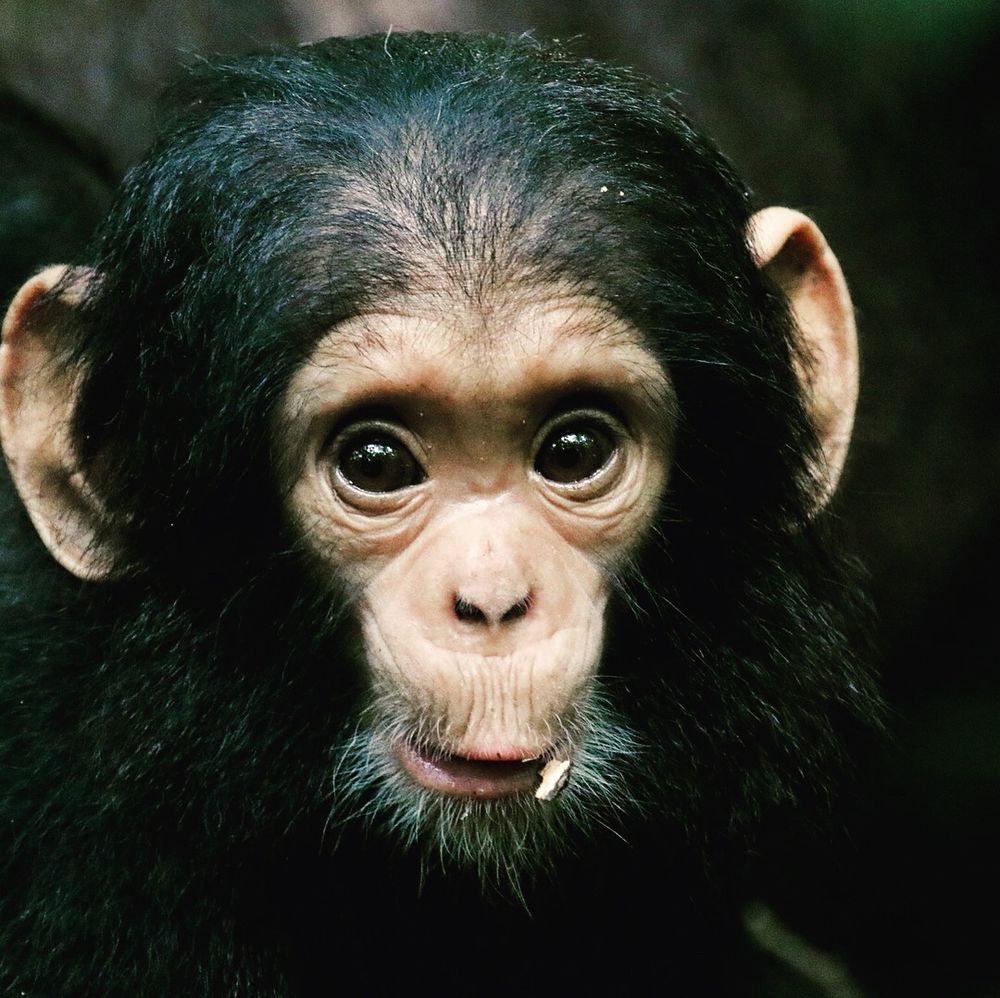
A tiny chimpfant looks at the camera with surprise
📣 Join the K/Creative Ape Team 🤓 2 PhDs on Creativity in Wild Chimpanzees & Bonobos; w myself & the v awesome @kathelijnekoops.bsky.social
@snf-fns.ch Uni Zurich @uniofstandrews.bsky.social @efp2026.bsky.social @ips-primatenews.bsky.social @primatesocietygb.bsky.social @primbehavecol.bsky.social 🐵🧪
02.07.2025 22:36 — 👍 39 🔁 33 💬 1 📌 6
We are hiring! Two PhD positions for interdisciplinary work on great ape communication and language evolution in a joint project with @marlenfroehlich.bsky.social & @elmanubohn.bsky.social.
🎯 evolutionary or probabilistic modeling
🗓️ deadline: Aug 13
🔗 tinyurl.com/2cnzwakj
01.07.2025 10:12 — 👍 8 🔁 4 💬 0 📌 1
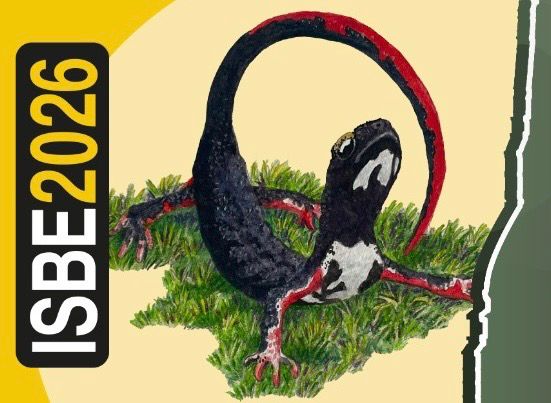
The Local Organizing Commitee welcomes behavioral ecologists from across the world and of all career stages to enjoy a five-day meeting rich in top-notch science and ample networking opportunities in Turin (Italy), 20-24 July 2026.
28.06.2025 21:24 — 👍 92 🔁 41 💬 1 📌 7
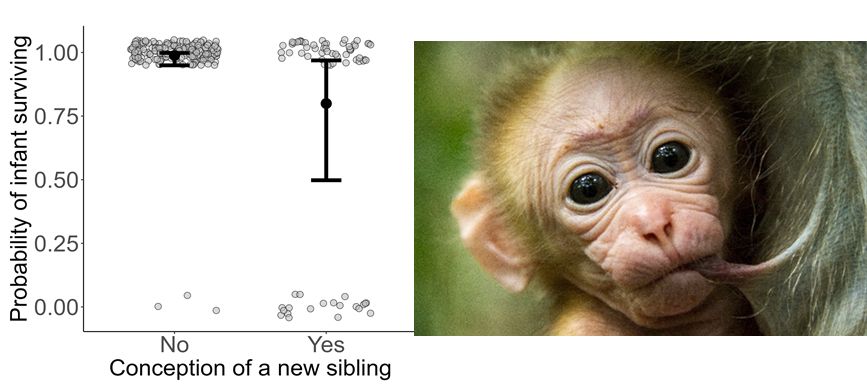
Assamese macaque females prioritize future over current offspring! Check out our paper (led by PhD researcher Shivani) showing reduced infant survival if mothers conceive early again!
tinyurl.com/4ka2ueyn
@primatenzentrum.bsky.social @uni-goettingen.de @primatecognition.bsky.social @dfg.de
18.06.2025 19:43 — 👍 5 🔁 2 💬 0 📌 0
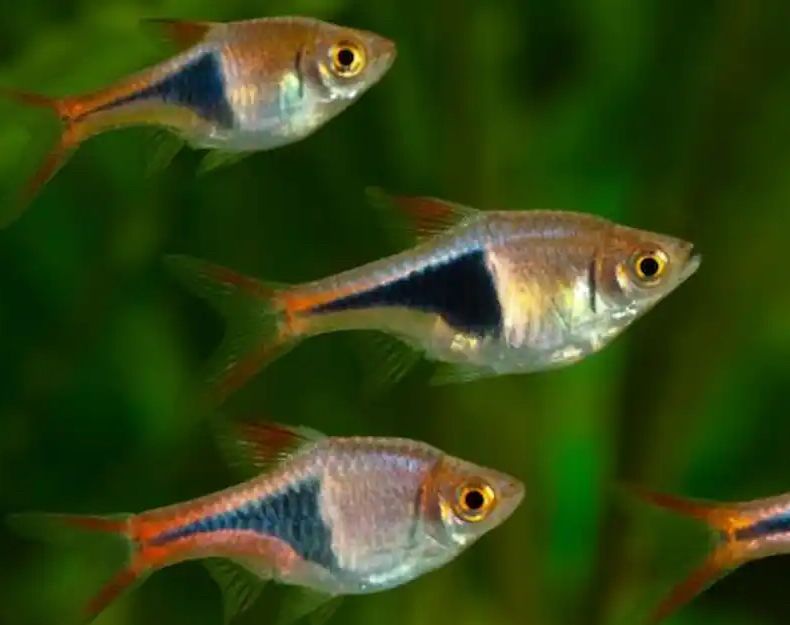
🐠💥2 year postdoc in fish sensory ecology!! 💥🐟
If you’re into animal colour, collective behaviour, predator-prey interactions, enjoy behavioural experiments and fieldwork, please apply! Based in Oxford with fieldwork in northwest Thailand (and elsewhere). Please repost! www.jobs.ac.uk/job/DNM294/p...
13.06.2025 06:50 — 👍 75 🔁 66 💬 1 📌 0
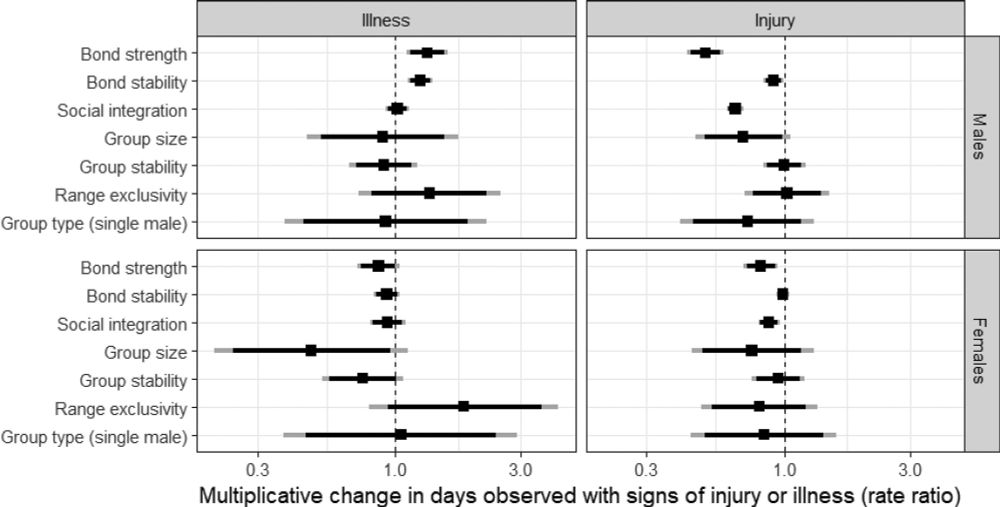
Group traits moderate the relationship between individual social traits and fitness in gorillas | PNAS
Evidence across a broad range of disciplines has demonstrated how individuals’ social
environments can impact their health, lifespan, reproduction,...
Thrilled to have the 1st project in my @snsf-ch.bsky.social Ambizione fellowship in @pnas.org this week. With Vic Martignac, @samellisq.bsky.social and @savinggorillas.bsky.social we asked what is a good social environment for a gorilla? And the answer was complicated... www.pnas.org/doi/10.1073/...
07.05.2025 15:24 — 👍 29 🔁 15 💬 2 📌 1
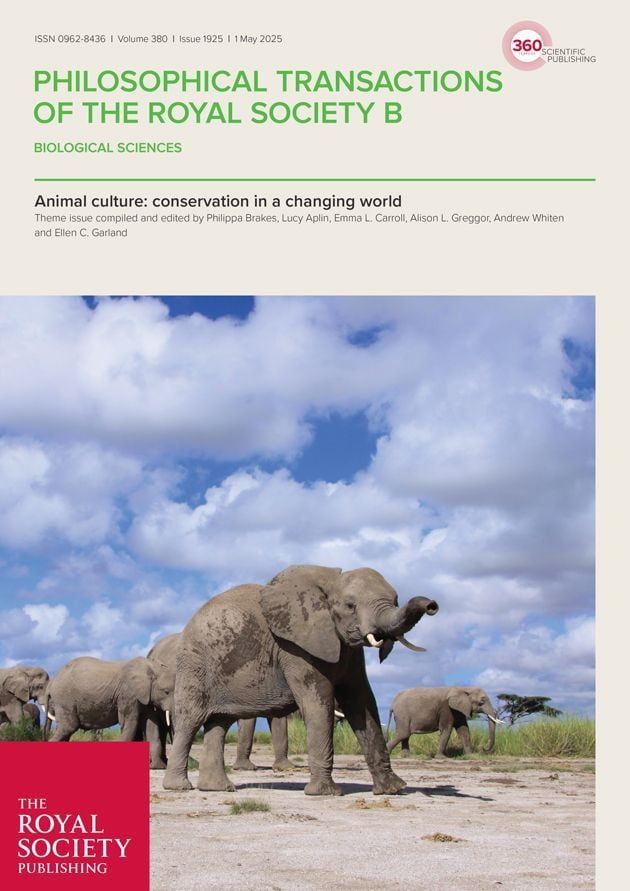
Traditions of behaviour have been found to be passed on in numerous species of animals. Now, major #conservation agencies have begun to recognize that these discoveries could have big implications for conservation agendas. Explore the new #PhilTransB issue: royalsocietypublishing.org/toc/rstb/202...
03.05.2025 18:42 — 👍 25 🔁 14 💬 2 📌 0
Spread the word: we're #hiring! We have an open #research fellowship position for #postdocs with their own research idea: It includes an own budget, a #PhD student position and the possibility to conduct independent research on animal #navigation and/or #magnetoreception 🧭🦤🦇🐟⚛️🧪👩🔬! sfb1372.de/jobs
29.04.2025 11:25 — 👍 5 🔁 22 💬 0 📌 2
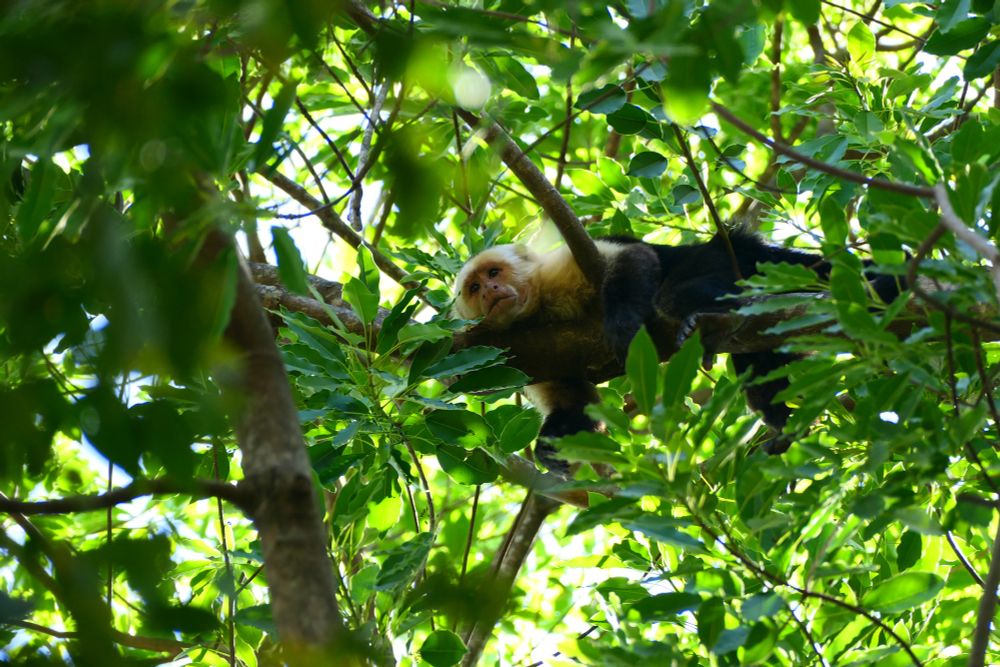
We asked how behavioral diversity & agonistic behaviors relate to group size in wild capuchins. We analyzed >65,000 behavioral scans collected over 15 yrs on 214 capuchins (8 groups) & controlled for # inds sampled. We found behavioral richness, diversity & agonism was higher in larger groups.
28.04.2025 04:15 — 👍 16 🔁 9 💬 1 📌 1
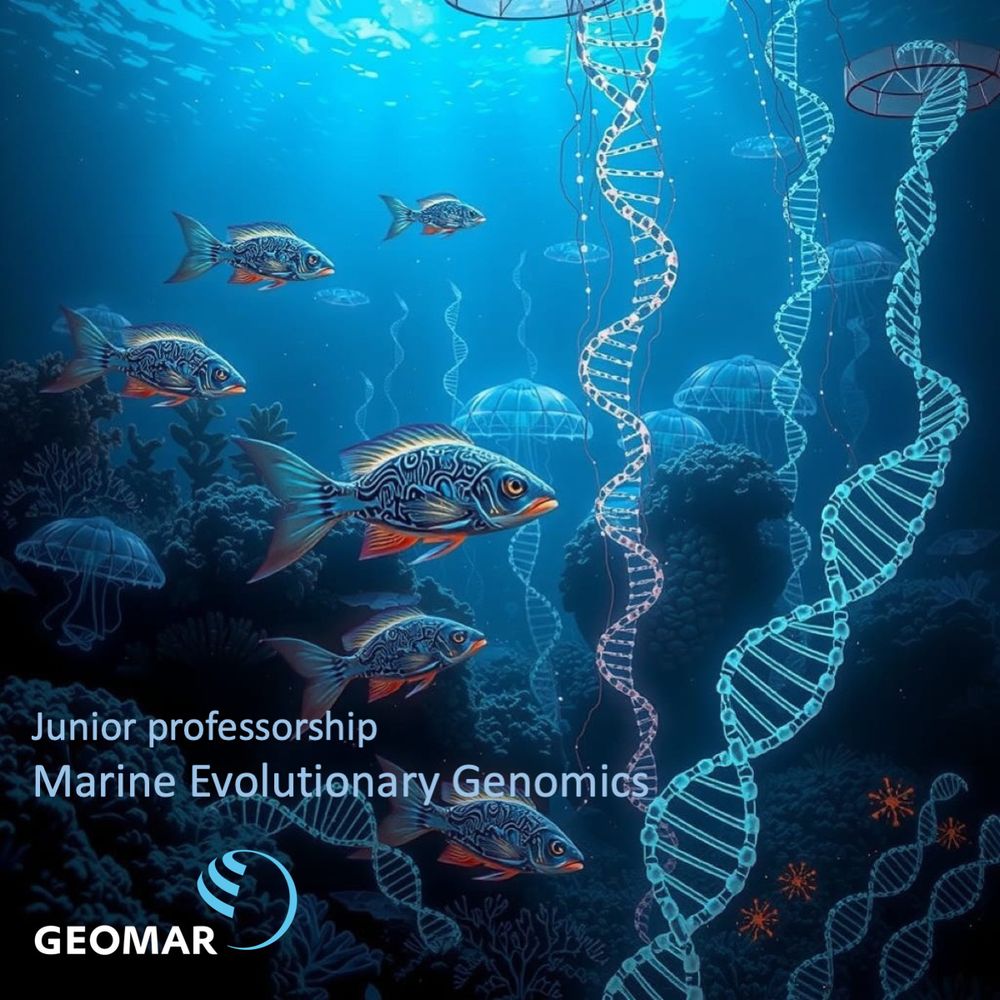
Junior faculty job alert in Germany - Marine Evolutionary Genomics @geomarkiel.bsky.social / University of Kiel www.geomar.de/en/karriere/... Marine study system of your choice (no microbes, sorry…), excellent infrastructure and ship access, moderate teaching requirements, closing date 6 June
26.04.2025 15:10 — 👍 76 🔁 93 💬 1 📌 4
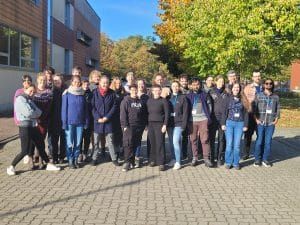
1. Home
»
2. Section Groups
»
3. Behavioural Biology
» Graduate Meetings
# Behavioural Biology
## Graduate Meeting
Interested in hosting a graduate meeting yourself? Please do not hesitate to contact the section speakers. We will support you with the application for funds.
### **Joint Graduate Meeting: Animal Behaviour 2025**
### **of the Ethological Society and the Behavioural Biology Section of the German Zoological Society (DZG)**
### **08.10. – 10.10.2025**
**Location**
University of Leipzig
We invite Bachelor and Master students, PhDs and early Post-docs to present and discuss their results with peers at the Joint Graduate Meeting of the Ethological Society and the Behavioural Biology Section of the German Zoological Society (DZG). The event is designed to provide a platform for undergraduate and graduate students to present their research, interact with peers, and engage in stimulating discussions about the latest trends and developments in the field of behavioural sciences.
For presenting your research you have the opportunity to give a talk (15+5 min) or present a poster in an informal and friendly atmosphere.
There will be**no registration fees.** The language of the conference is English.
******Invited speakers**
Melanie Dammhahn (University of Münster)
Thomas Bugnyar (University of Vienna)
FURTHER INFORMATION WILL FOLLOW
The organisers:
Dr Ahana A. Fernandez, Dr Sabine Kraus, & Dr Christian Nawroth
### Short report: Graduate Meeting Behavioural Biology 2024
From 16.10-18.10 2024, the joint Graduate Meeting of the Behavioural Biology Section of the German Zoological Society (DGZ) and the Ethological Society (EthoGes) took place at the University of Rostock and the Research Institute of Farm Animal Biology (FBN) in Dummerstorf. The multi-day programme was diverse and multifaceted.
The first plenary talk was given by Dr Katja Liebal (University of Leipzig) on The attitude of children towards other animals – a comparative cultural perspective. Dr Liebal’s lecture was integrated into the lecture series „Zoologische Vorweisungen“. This lecture is open to all students and also to the interested public and the audience was accordingly mixed. The lecture and discussion round was a complete success and once again put our Graduate Meeting in the spotlight. The next day, Pizza Chow (University of Chester) gave another plenary talk on problem-solving in wild squirrels, which was also enthusiastically received.
Young scientists – from Master’s to postdoc level – gave 10 exciting presentations on a wide range of topics such as animal welfare, social behaviour, cognition and communication. In a poster session, four interesting posters were examined and discussed in detail. In a joint workshop, all participants, including the two plenary speakers, discussed questions relating to science and academic work. Questions submitted anonymously by all participants were collected in advance and divided thematically into discussion blocks.
On the last day, posters and presentation awards were distributed. The presentation awards went to Eva Mardus (‘The numerical competence of the greater spear-nosed bat Phyllostomus hastatus’). The poster award went to Anustup Bandyopadhyay (‘The impact of alternative reproductive tactics on the cognitive abilities of male wild house mice’). The event was rounded off with a guided tour of the FBN on Friday afternoon and a tour of the Marine Science Centre (University of Rostock) on Saturday morning. Overall, the Graduate Meeting ‘Animal Behaviour’, with over 31 participants, was a successful event that offered young scientists a platform to present their work and themselves and to make important contacts. Thanks to grants from the DZG and the Ethologische Gesellschaft, the Graduate Meeting could be held without a participation fee. We, the speakers of Behavioural Biology, are already looking forward to the next Graduate Meeting, which is expected to take place in Leipzig in October 2025.
Gruppenfoto des Graduate Meetigs Verhaltensbiologie 2024 (FBN Dummerstorf) Group picture of the Graduate Meeting Behavioural Biology 2024 (FBN Dummerstorf)
### **Joint Graduate Meeting: Animal Behaviour 2024**
### **of the Ethological Society and the Behavioural Biology Section of the German Zoological Society (DZG)**
### **16.10. – 18.10.2024**
**Locations**
University of Rostock
Universitätsplatz 1, 18051 Rostock, Germany
&
Research Institute for Farm Animal Biology (FBN)
Wilhelm-Stahl-Allee 2, 18196 Dummerstorf, Germany
We invite Bachelor and Master students, PhDs and early Post-docs to present and discuss their results with peers at the Joint Graduate Meeting of the Ethological Society and the Behavioural Biology Section of the German Zoological Society (DZG). The event is designed to provide a platform for undergraduate and graduate students to present their research, interact with peers, and engage in stimulating discussions about the latest trends and developments in the field of behavioural sciences.
For presenting your research you have the opportunity to give a talk (15+5 min) or present a poster in an informal and friendly atmosphere.
There will be**no registration fees.** The language of the conference is English.
**Important dates:**
Deadline for abstract submission: **18th of August 2024**.
Presenter notification: 16th of September 2024
Registration deadline (attendance without presentation): **30th of September 2024**
******Invited speakers**
Dr Katja Liebal (University of Leipzig)
_Die Einstellung von Kindern gegenüber anderen Tieren – eine kulturvergleichende Perspektive (“Children’s attitudes towards other animals – a cross-cultural developmental approach”)_
Dr Pizza Chow (University of Chester)
_Problem-solving in wild squirrels_
******Programme
**
You can download the recent programme for the Graduate Meeting here
Programme
Programme Joint Graduate Meeting Animal Behaviour 2024
**Venue**
You can find more information on the University’s main building here.
On Thursday and Friday, the meeting will take place in the Conference Centre of the FBN in Dummerstorf (about 12 km outside of Rostock).
**Travel**
**Connections to Rostock:** You can reach Rostock by car, bus, train or ferry (https://www.rostock.de/en/transport/arrival-parking.html).
**Connections from Rostock to Dummerstorf:** We will offer a shuttle transfer from Rostock city centre to Dummerstorf in the morning and the afternoon on Thursday and Friday. For individual travelling, there are frequent bus connections going from Rostock-Dummerstorf-Rostock and an S-Bahn station in the next village (Kavelsdorf) that will bring you to Rostock main station.
******Accommodation possibilities**
Blue Doors Hostel
B&B HOTEL Rostock-Hafen
Motel ONE
******Caterin****g during the meeting & Social dinner **
**Social dinner (self-paid)**
L’Osteria
Café Marat
**Catering during the meeting**
Coffee, tea, beverages, and cookies will be provided for the small breaks. We have planned pizza and sandwiches for the lunch breaks. Please let us know if you have any allergies or intolerances when registering. Alternatively, there are supermarkets and a bistro near the institute.
Don´t miss this opportunity and join us for a fun and stimulating meeting, get to know your peers and grow your network. We are looking forward to seeing you in Dummerstorf. If you have any questions don´t hesitate to contact us.
The organizers:
_Dr Ahana A. Fernandez, Dr Sabine Kraus, & Dr Christian Nawroth_
### Brief report: Graduate Meeting Behavioural Biology 2023
The joint Graduate Meeting of the Behavioural Biology Section of the German Zoological Society (DGZ) and the Ethological Society (EthoGes) took place in Bielefeld from 08.11-10.11.2023. The three-day programme included two excellent plenary talks, outstanding oral presentations by students and an exciting poster session.
The plenary talks were held by Dr Angela Stöger (Institute for Sound Research at the Austrian Academy of Sciences) on communication and cognition in elephants and by Dr Antonino Calapai (Primate Centre Göttingen) on a new adaptive approach to cognitive training in captive primates. Young scientists – Master to Postdoc level – gave 16 exciting talks on various topics such as animal welfare, social behaviour, cognition and behavioural physiology. During the poster session, five interesting posters were examined and discussed in detail. In a joint workshop, all participants, including the two plenary speakers, additionally discussed questions relating to science and academic life. The event was closed with a guided tour of the Department of Behavioural Biology at Bielefeld University.
With over 30 participants in total, the Graduate Meeting of Behavioural Biology was a successful event. Thanks to grants from the DZG and EthoGes, the Graduate Meeting could be held without a participation fee.
Two presentation prizes were awarded to: Elena Groneberg (“Lefty or righty? Investigating behavioural lateralisation in rats”) and Annkatrin Pahl (“Dwarf goats show altruistic behaviour in a novel food giving paradigm”).
The poster prize went to Jana Deutsch (“Goats staring at video screens – behavioural responses of goats to images of familiar and unfamiliar conspecifics”).
##### Programme
Detailed Programme Joint Graduate Meeting Behavioural Biology Section 2023
**Registration open for the joint Graduate Meeting of the Ethological Society and the Behavioural Biology** **Section of the DZG**
You can register now! We are looking forward to your registration.
_Here are some important key dates:_
Abstract deadline: **15th of September**
Registration (attendance without presentation) deadline: **13th of October**
**Joint Graduate Meeting of the Ethological Society and the Behavioural Biology** **Section of the DZG**
This year’s graduate meeting will take place from **08.11. – 10.11.2023** in **Bielefeld**.
We cordially invite Bachelor and Master students, PhD students and early postdocs to present their results in the form of a talk or poster in an informal and friendly atmosphere and to discuss with their peers.
As guests, **Dr. Angela Stöger** (University of Vienna) & **Dr. Antonino Calapai** (German Primate Center Göttingen) will accompany this meeting.
There will be _no_ registration fees. The conference language will be English. We will inform about the registration formalities and further details here soon.
We are looking forward to seeing you!
### 2022
30.11. – 01.12.2022 Virtual Graduate Meeting of the Behavioural Biology Section of the DZG
Keynote speaker:
Mirjam Knörnschild
Tobias Krause
Anja Guenther
### 2019
23.10. – 25.10.2019 Joint Graduate Meeting of the Ethological Society and the Behavioural Biology Section of the DZG at the Max Planck Institute for Evolutionary Biology in Plön
Keynote speaker:
Prof. Dr. Heiko Rödel
Dr. Barbara Caspers
Prof. Walter Arnold
### 2017
11.05. – 12.05.2017 Joint Graduate Meeting of the Ethological Society and the Behavioural Biology Section of the DZG at the Institute of Animal Welfare & Animal Husbandry
Friedrich-Loeffler-Institut in Celle
Keynote speaker:
Marc Naguib
Lars Schrader
Wiebke Schuett
### 2016
03.-05.06.2016 Joint Graduate Meeting of the Ethological Society and the Behavioural Biology Section of the DZG at the Biological Station Gülpe (University of Potsdam)
Keynote speaker:
Julia Ostner
Tim Caro
* News
* Information
* Graduate Meetings
* DZG Annual Meeting / Symposia
* Email-Distribution-List
* Section Speaker
* Contact
The Joint Graduate Meeting: Animal Behaviour 2025 of the Ethological Society and the Behavioural Biology Section of the DZG will be in Leipzig in early October
https://www.dzg-ev.de/en/section-groups/behavioural-biology/graduate-meetings/
registration is free
25.04.2025 14:00 — 👍 5 🔁 5 💬 0 📌 0
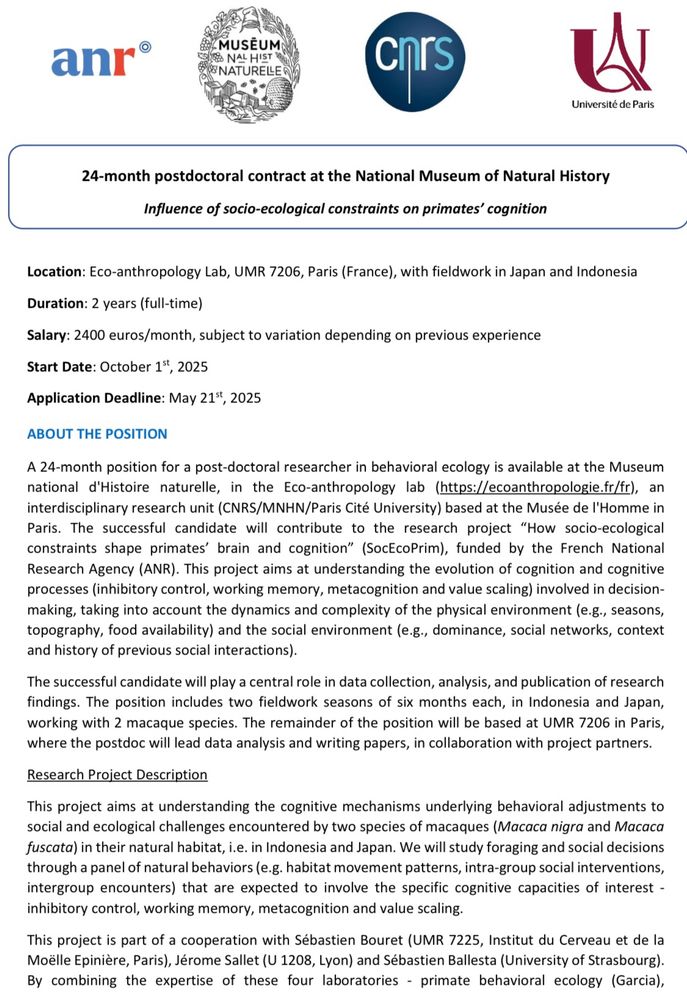
Description of the Postdoc position
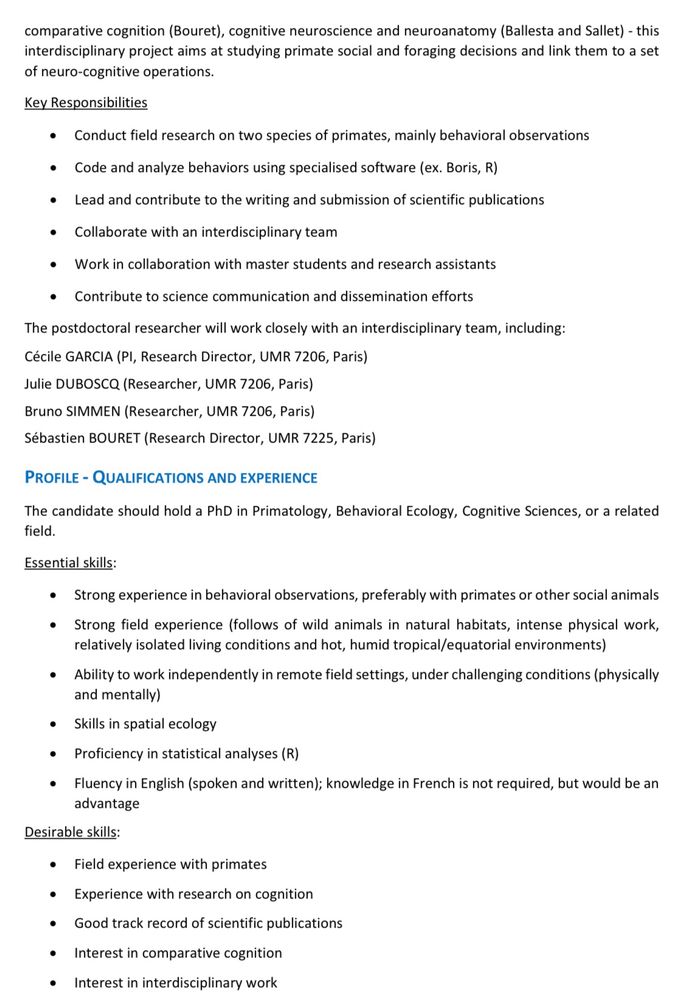
Description of the Postdoc position
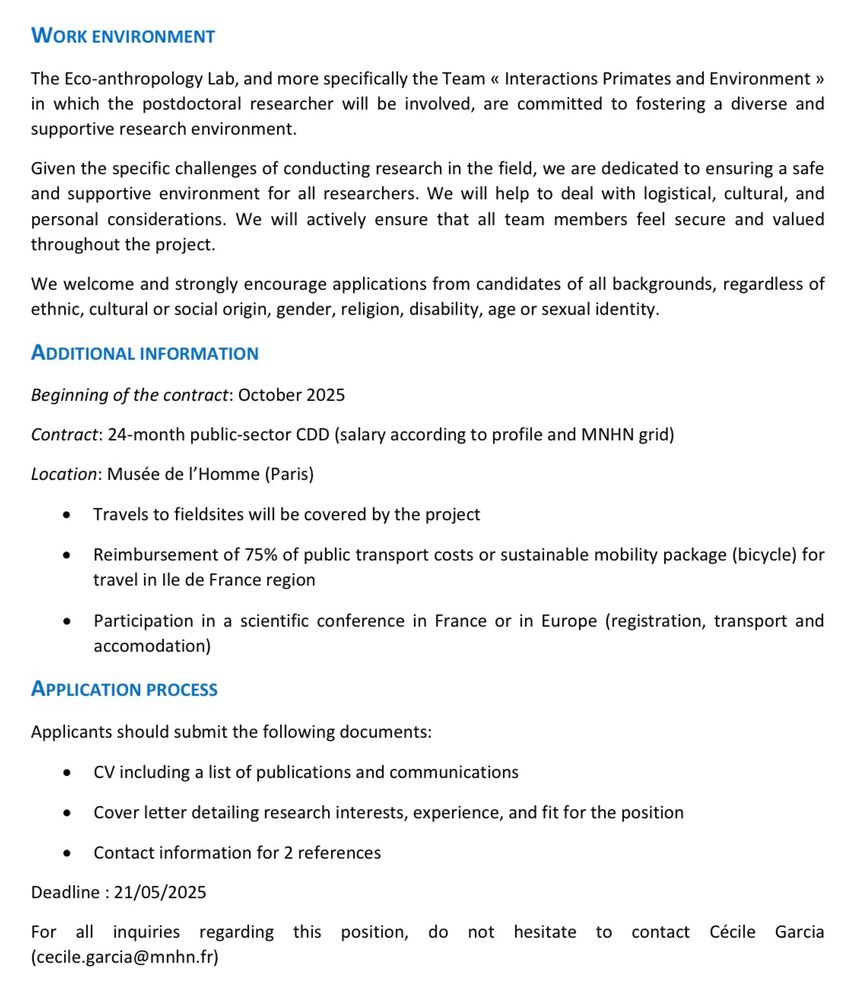
Description of the Postdoc position
New Postdoc position!
🐵🐵🐵🐵
On the socioecology of cognition in primates, based in Paris @mnhn.fr @cnrs.fr, with field work
It has it all:
- the best science
- the best macaques
- the best beaches
- the best people
- the best office view #Eiffeltower
Join us!
17.04.2025 15:46 — 👍 35 🔁 48 💬 0 📌 2
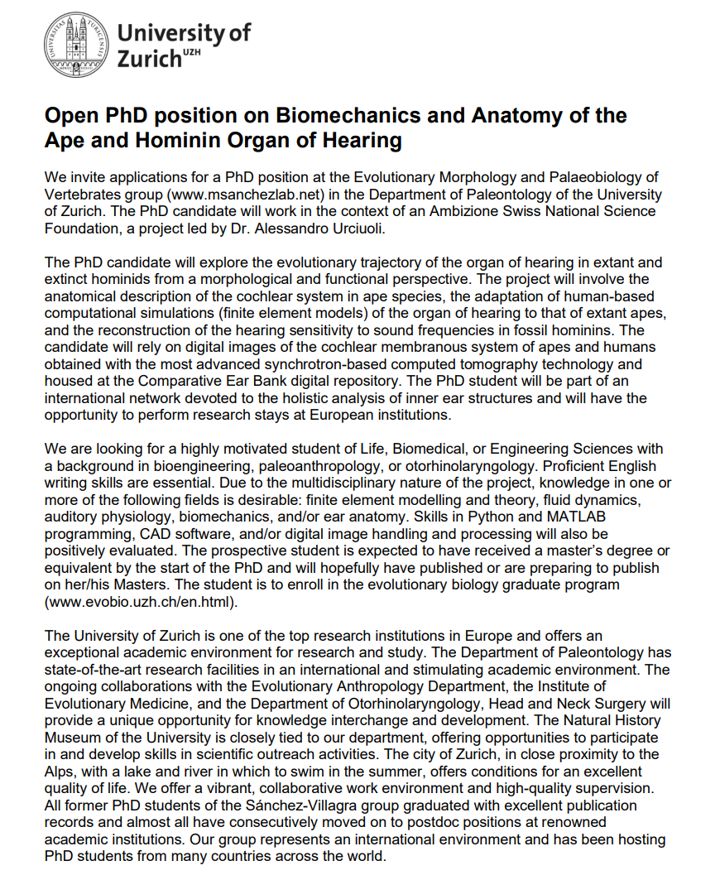
Details of the job offer for the PhD position Open PhD position on Biomechanics and Anatomy of the
Ape and Hominin Organ of Hearing
We invite applications for a PhD position at the Evolutionary Morphology and Palaeobiology of
Vertebrates group (www.msanchezlab.net) in the Department of Paleontology of the University
of Zurich. The PhD candidate will work in the context of an Ambizione Swiss National Science
Foundation, a project led by Dr. Alessandro Urciuoli.
The PhD candidate will explore the evolutionary trajectory of the organ of hearing in extant and
extinct hominids from a morphological and functional perspective. The project will involve the
anatomical description of the cochlear system in ape species, the adaptation of human-based
computational simulations (finite element models) of the organ of hearing to that of extant apes,
and the reconstruction of the hearing sensitivity to sound frequencies in fossil hominins. The
candidate will rely on digital images of the cochlear membranous system of apes and humans
obtained with the most advanced synchrotron-based computed tomography technology and
housed at the Comparative Ear Bank digital repository.
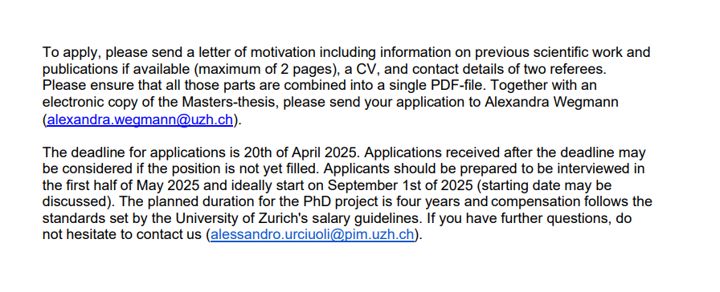
To apply, please send a letter of motivation including information on previous scientific work and
publications if available (maximum of 2 pages), a CV, and contact details of two referees.
Please ensure that all those parts are combined into a single PDF-file. Together with an
electronic copy of the Masters-thesis, please send your application to Alexandra Wegmann
(alexandra.wegmann@uzh.ch).
The deadline for applications is 20th of April 2025. Applications received after the deadline may
be considered if the position is not yet filled. Applicants should be prepared to be interviewed in
the first half of May 2025 and ideally start on September 1st of 2025 (starting date may be
discussed). The planned duration for the PhD project is four years and compensation follows the
standards set by the University of Zurich's salary guidelines. If you have further questions, do
not hesitate to contact us (alessandro.urciuoli@pim.uzh.ch)
🚩#joboffer New PhD student position - Palaeontology Department at the University of Zurich (Switzerland).
the evolutionary trajectory of the organ of hearing in extant and extinct hominids from a morphological and functional perspective. uzhcareer.ch/de/jobs/deta...
24.03.2025 13:57 — 👍 2 🔁 2 💬 0 📌 2

Applications now open for UNIL Summer School on Modelling for Evo Bio (1–6 Sept 2025, Lausanne)!
Aimed at PhD students interested in formal approaches to evolutionary ecology questions like sexual selection, social & life-history evolution. Scholarships available.
Pls share! www.shorturl.at/znk5g
17.04.2025 15:21 — 👍 43 🔁 47 💬 0 📌 5

Förderinitiative „Künstliche Intelligenz“
The DFG is funding independent research groups in AI (tinyurl.com/36f5m6kd). If you're interested in coming to Göttingen (Germany) by applying for one of these groups, we have an online event to inform you what the process is and how we could support you (tinyurl.com/yfpeambm). Check it out!
07.04.2025 20:48 — 👍 10 🔁 6 💬 1 📌 2
Interested in an Emmy Noether Group on “Methods in AI”?
Discover opportunities at the @thegoecampus.bsky.social!
Join the online info event by the Campus Institute Data Science to learn more & connect:
📅 April 23, 5 PM
🔗 www.uni-goettingen.de/en/696563.html
#AI #EmmyNoether #DataScience #Göttingen
11.04.2025 08:37 — 👍 0 🔁 2 💬 0 📌 0
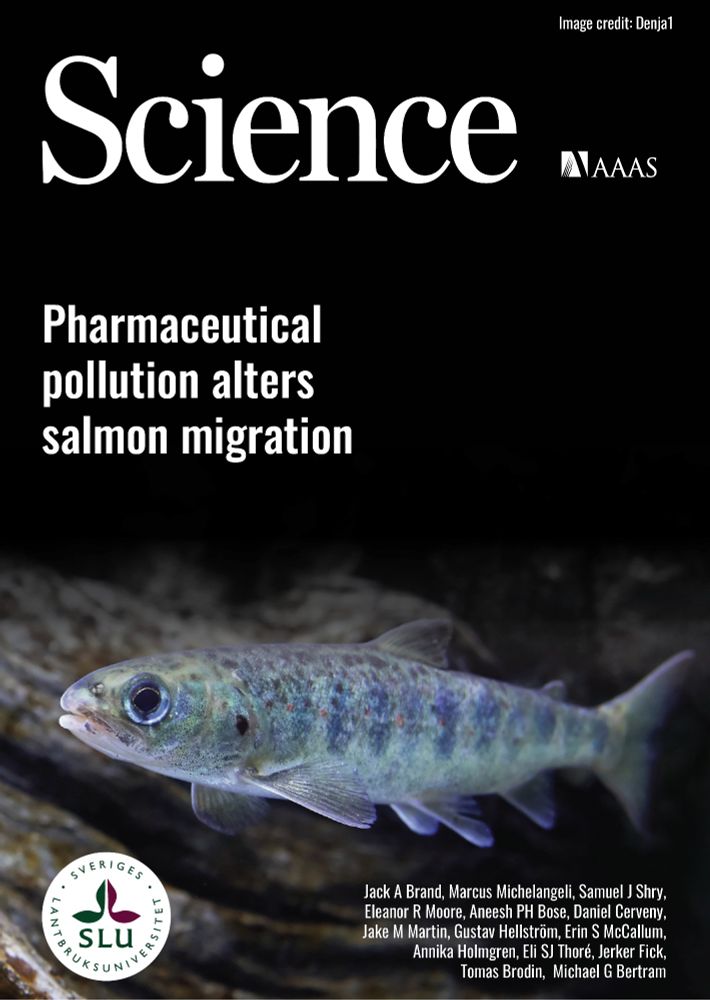
Over the moon to finally share our new study in @science.org led by the amazing @jack-brand.bsky.social!
Pharmaceutical pollution at environmentally realistic levels alters behaviour and migration in Atlantic salmon, directly affecting survival
👉 science.org/doi/10.1126/...
10.04.2025 20:03 — 👍 96 🔁 42 💬 7 📌 2
Account for the research project jointly run at ANU and UZH and led by Lucy Aplin, studying spread of innovation, culture and cognition in urban cockatoos
https://www.clevercockies.com/
Assistant Professor, Environmental Studies, NYU
Primatologist, Author of THE ARROGANT APE
https://www.cewebb.com
Passionate Conservationist 🇳🇬🇳🇬🦍🐒 behavioral ecologist, ASAB ECR Council member. Looking for a Postdoc position
International Society for Behavioral Ecology Congress, Turin (Italy) 20-24 July 2026
Our NIA-funded Research Network supports research that integrates animal models into studies of social aging. We facilitate idea exchange among early-career researchers working on animal models and support projects in areas of network interest.
studying the biological, neuropsychological, and computational underpinnings of curiosity at University of Göttingen; funded by Deutsche Forschungsgemeinschaft (DFG)
Web: https://www.uni-goettingen.de/en/681631.html
Impressum: www.uni-goettingen.de/de/
Asst. Prof. in Psychological and Brain Sciences and Anthropology @ UC Santa Barbara | UC PPFP Fellow | Fascinated by great ape social cognition!
https://www.laurasimonelewis.com/
https://www.originsofmindlab.com/
Check here for updates on the EFP 2026 conference, to be held in Montpellier, France, 29th June- 3rd July 2026.
I love animal behaviour, behavioural ecology, life history strategies, quantitative genetics, social evolution, SQuID-teaching, mixed models, birding, dragonflies, chickens, diving, the sea & the mountains. Prof @lmumuenchen. Views are my own. He/him
Interested in Biodiversity and why there is so much variation out there. Evolution, Genetics, Behaviour, Ecology, Conservation, nowadays also Physiology. Studying Waders/Shorebirds. Currently at Max Planck BI.
Behavioral Ecology is the official journal of the International Society for Behavioral Ecology (ISBE). Run by @birgitszabo.bsky.social #behavecol
The Ludwig-Maximilians-Universität in Munich founded the Center for Advanced Studies in 2008. Since then, fellows from all over the world joined CAS.
Scientific journal publishing research, overview, commentary across all of biology. All of it!
https://www.cell.com/current-biology/home
Part of CellPress
Wildlife Photographer, Author, Biologist, Storyteller.
Contributor @natgeo @bbc wildlife magazine
Behavioural ecologist & scientist @DPZ_eu
animal behaviour | mammal communication | bioacoustics
Lecturer in Philosophy at the University of Reading |
Most of my recent writing is on animal consciousness and welfare
Collaborative Research Centre on Magnetoreception & Navigation in Vertebrates. www.sfb1372.de
Uni Oldenburg, Bochum, Berlin, @ifv-whv.bsky.social, Weizmann Institute, Uni Oxford. Funded by @dfg.de.
Find our tweets from X here: @sfb1372-x.bsky.social
neuroscientist, pain/opiates, mom of boys and goldens, wife of Larry Young, Pinot lover, amateur chef, President of ‘'Fuck Trump' club. Posts are my own

